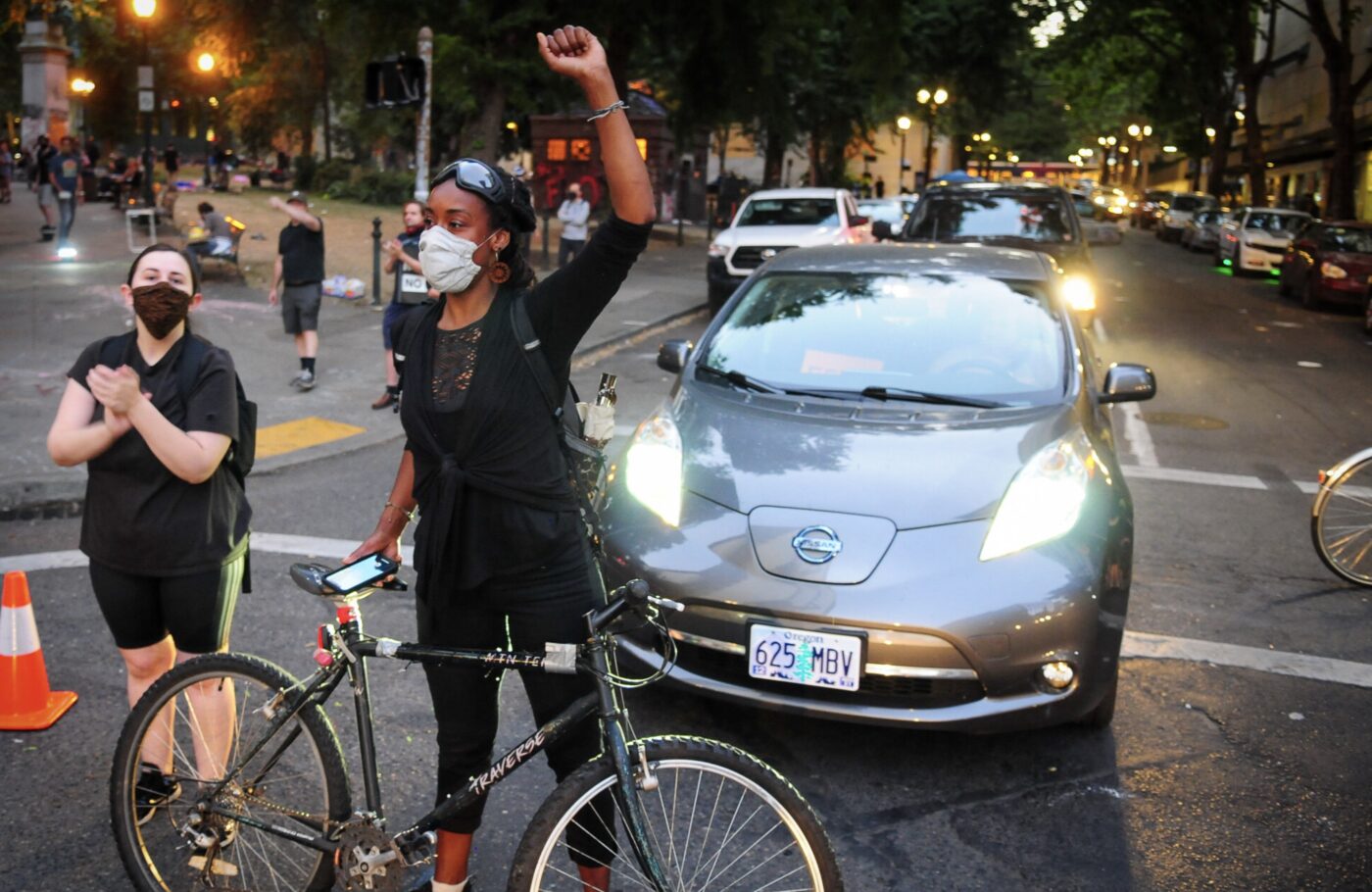
As we shared last month, a law making its way through the legislative process in Salem has some folks concerned that it could be applied broadly enough to capture a common form of traffic management during large events known as “corking.” In Portland, corking is typically done by bicycle riders because of their ability to move quickly through streets and use their bikes to form a wall in front of cross-traffic in a way that encourages drivers to stop and wait for people in a parade, protest or big group ride to get across an intersection safely.
The chief sponsor of House Bill 2572, Representative Dacia Grayber (D – Tigard), heard this concern from the community and took up the issue directly with the state’s Office of Legislative Counsel. “LC” as it’s known in Salem, is an office of legal experts that writes and edits bill language, researches statutes, advises lawmakers on legal matters, and so on.
Grayber and other supporters of the bill see it as a crucial tool to thwart paramilitary activity from groups or individuals who do things like attack power stations, form gun-toting militias to intimidate others, and so on. To increase its odds of passage, Grayber wants to prove to Oregonians that activities like bicycle corking would not be caught up in the law if the bill passed.
According to the Chief Executive of the Office of Legislative Counsel, Dexter Johnson, corkers have nothing to worry about.
In a letter (PDF) to Rep. Grayber dated April 28th, Johnson writes: “You asked whether the -3 amendments to House Bill 2572 would apply to persons engaging in ‘corking,’ or using bicycles in a coordinated manner to restrict or block traffic during a protest, march or demonstration. The answer is, most likely, no.”
Here’s the salient excerpt from Johnson’s letter:
“In order to be subject to a cause of action under the -3 amendments to HB 2572, a person who engages in corking would need to: (1) act as part of, on behalf of or in furtherance of an objective of, a private paramilitary organization; (2) be armed with a dangerous or deadly weapon; and (3) engage in the specific conduct described in the -3 amendments. The conduct that seems most applicable to corking is when a person “[a]ssumes, exercises or asserts, without legal authorization, the functions, powers or duties of” law enforcement or local government officials, or prevents a person “from engaging in conduct in which the other person has a legal right to engage.” Beginning with the third element described above, it is possible that a court would find that, by blocking traffic, a person engaging in corking is preventing persons from being able to engage in conduct in which they have a legal right to engage (proceeding down the street), or is assuming the function of a law enforcement officer performing traffic control functions. However, a person engaging in corking likely would not satisfy the other two elements and therefore would not be subject to the cause of action…
a group of persons blocking traffic with bicycles is most likely not functioning as a combat, combat support or law enforcement unit. The term “security services” is not defined, but a court seeking to determine the meaning of that term would engage in a structured methodology to discern the intent of the Legislative Assembly that enacted the statute in question.2 Under this methodology, a court looks first to the text and context of the statute, considers proffered legislative history and finally weighs general maxims of statutory construction if there is any remaining uncertainty.”
As to whether a bicycle could be considered a “dangerous weapon,” Johnson says that’s very unlikely:
“… a bicycle is not a deadly weapon, as it is not ‘specifically designed for’ causing death or serious physical injury. A bicycle is also not a dangerous weapon unless the bicycle is ‘used, attempted to be used or threatened to be used’ in a manner that is ‘readily capable of causing death or serious physical injury.’ A court would almost certainly find that when a person is simply standing with a bicycle, blocking traffic, the bicycle is not a dangerous weapon.”
Johnson concludes by saying his office believes corkers would not be subject to the law.
HB 2572 is scheduled for a work session and possible vote today (5/11) at 1:00 pm in the House Committee on Rules.

